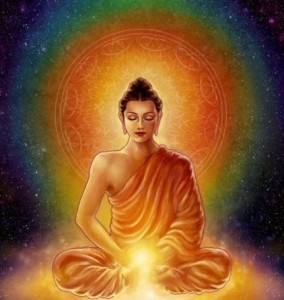A seeker asked:
I have recently decided to take a journey in the Buddhist faith. I am
learning a lot about Buddha and his basic teaching and am also making
effort in practicing them. However due to my previous lifestyle am
finding it difficult to control lust and anger, please tell me more
about this particular area and any other topic. Thanks.
Buddha made a profound observation when he came to the realization that within us are what he called the 5 kleshas, or poisons. These are:
1. attachment, desire, passion
2. aversion, anger, aggression
3. ignorance, delusion
4. pride, arrogance
5. envy
These poisons exist in the mind as mental states that prevent us from attaining true happiness, true love, true compassion, and true liberation. If we indulge ourselves in the kleshas we foster that that way of being. It becomes our primary operating state or frequency. Each time we indulge we give the particular klesha energy or food for growth.
Here we will focus on the kleshas of lust and anger. Why do we experience lust? Why do we experience anger? And how do we overcome these poisons?
We must come to an understanding that within us are certain instincts – the instinct of fight or flight; the instinct to procreate, etc. We must understand that that we have three different brains that take charge at different times depending on the circumstances. The brain in the head contains the cerebrum and the cerebellum which basically means ‘brain’ and ‘little brain’. There is also a nerve plexus in the digestive area, this gives you that ‘gut feeling’. We must understand that the brain releases chemicals, like oxytocin, serotonin,dopamine, and so on when stimulated by a thought or an image. We also have adrenalin that gives us a high and greater tolerance to pain. We have a nervous system and we have a chakra system. All these chemicals, glands, organs, instincts, and systems play a part in the complexity of the human condition and the understanding of why we do what we do.
The most important lesson that Buddha imparted was that none of the kleshas can lead to lasting happiness and that they in fact lead to less than satisfactory states and lead one to experience karmic consequences. It may feel good to be angry in the heat of the moment, but the consequence is that you may hurt another physically or verbally. Indulging in lust may feel good in the moment but lusty feelings usually leave you feeling unfulfilled, empty, and may also make you do things you regret later, like cheating on your spouse. So much damage and so much karma can arise just by slipping into the grasp of the kleshas.
So what to do? Repress? No! Repression is not the solution because this does not get to the source; it is like cutting the stem of a weed without pulling the root out. Inevitably, the root will remain in your subconscious and will grow even stronger.
There are two solutions: Grow and nurture your virtues, and go deep into your awareness when the klesha arises.
To grow and nurture your virtue Buddha offered the Eightfold Path, a way of living that ends suffering and brings about good outcomes rather than the harmful consequences of accruing karma through losing one’s self in the lure of the kleshas. The eight precepts are:
Right Understanding Learning the true nature of reality, life and existence.
Right Aspiration This your commitment to refining yourself.
Right Effort This is the avoidance of being lazy and falling off the path.
Right Speech Speaking with wisdom and truth.
Right Conduct Living in a righteous and moral way.
Right Livelihood Earning a living in a way that doesn’t harm others, the environment, or animals.
Right Mindfulness Remaining aware and conscious in each moment.
Right Concentration Spending time in meditation and contemplation.
These precepts are easy to adhere to when things are going well and there are no distraction, but what about when you are provoked? This is when you must practice being aware – to not fall into the unconscious states that the kleshas draw you into. You may have observed when someone become so enraged; their face changes, their breathing changes, the eyes change, the body changes and suddenly the person acts so vile that he or she is literally a different person. You may be familiar with the story of Jeckyl and Hide. This is what lurks within each of us; the good and the bad, the saint and the sinner, the compassionate and the cruel.
There are three stages that one can become aware in.
1. After the klesha; this is too late! The damage has been done but we can at least look back and reflect to at least gain a lesson or some insight.
2. During the klesha; this is when we are in the middle of its hold and we come to the sudden realization: “What am I doing?” This may give you time to stop and correct the situation before it escalates. For example, you may be in a heated argument and saying things that are hurtful. If you become aware you can stop, think, and perhaps apologize and correct the situation before any permanent damage is done.
3. As the klesha is bubbling inside; you become aware that a feeling is arising within and you know where it will lead so you immediately remove yourself from the situation or go deep into your consciousness to remain untouched. An example of this maybe an alcoholic who is at a friend’s house. The friend pours himself a drink and the the alcoholic feels the temptation arising. Instead of allowing himself to get caught in the net he decides to leave.
The Science of Yoga addresses all the above, but also approaches them from addition perspectives. The Buddhists say the undisciplined mind is like an elephant on a rampage, causing destruction wherever it goes. Through the discipline of the body we gain discipline of the mind. Through the use of mantras we harmonize the brain frequencies. Through pratyahar we synchronize the individual mind to the Infinite mind. The other perspective is the balancing of the chakras. If we know there is an imbalance in one or more of the chakras we can do asanas that specifically work that chakra. As the chakra balances the associated klesha and its power over us begins to subside.
Yoga is the practice of purification – of inner alchemy that transform the person of base instincts into a refined and regal human being. As Buddha taught, when we reach the right understanding it will encourage our aspirations and we will want to continue putting effort as we see results. Our speech will change and our conduct will change, becoming more and more dignified. This will be reflected in our livelihood as we remain mindful. With these conditions we can live a meditative life in which all that we do, all that we say,all that we think, and all that we observe is done so through the perspective of the Soul.
Blessings,
Johannes ~ Sevaji





